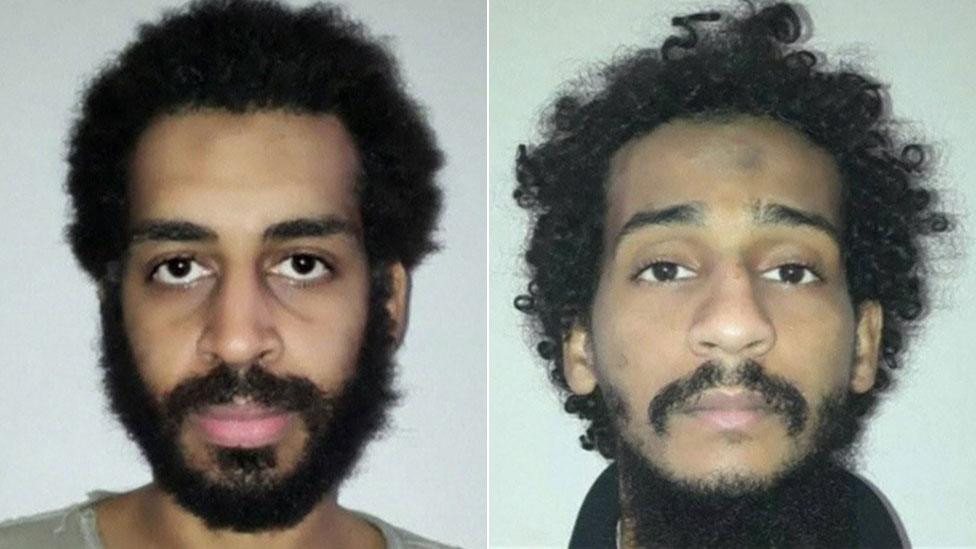Turkey Syria offensive: Dozens killed as assault continues
- Published
The BBC's Martin Patience explains what's behind the conflict
Casualties are increasing as Turkey presses on with its cross-border offensive on Kurdish-held areas of northern Syria.
At least 11 civilians have died and dozens of fighters from the Kurdish-led SDF and pro-Turkish factions have been killed, reports say.
The first death of a Turkish soldier was confirmed by Turkey's military.
Tens of thousands of people have fled their homes, amid growing international criticism of the offensive.
Turkey moved into northern Syria on Wednesday after US President Donald Trump pulled American troops out of the area.
Analysts say the US withdrawal in effect gave Turkey the green light to begin its cross-border assault.
Much of the region has been outside the control of the Syrian government as a consequence of the civil war which began in 2011. It has been controlled by the Syrian Democratic Forces (SDF) since 2015.
The SDF have been key allies of the US in the battle against the Islamic State (IS) group but Turkey regards the Kurdish militias of the SDF as "terrorists" who support an anti-Turkish insurgency.
Turkey defended its offensive as a bid to create a "safe zone" free of Kurdish militias which could also house Syrian refugees.
One major concern for the international community is the fate of thousands of suspected IS prisoners, including many foreign nationals, being guarded by Kurdish-led forces in the region.
What's the latest on the fighting?
On Thursday, Turkish troops partly encircled the border towns of Ras al-Ain and Tal Abyad.
But while the Turkish military said its operation was going to plan, Kurdish sources and activists from the Syrian Observatory for Human Rights (SOHR) said the offensive had not made much progress.
Turkish warplanes have struck targets in both towns, and video footage has shown columns of smoke rising above them. Tal Abyad's only public hospital has been forced to close.


The Kurdish Red Crescent said there had been 11 confirmed civilian deaths so far and 28 serious injuries, mostly in Ras al-Ain and another border town, Qamishli. Some are children.
At least five people, including a Syrian baby, were reportedly killed in Kurdish shelling of Turkish border towns.
The SOHR reported at least 29 deaths among the SDF and 17 from among pro-Turkish Syrian rebels, the Syrian National Army, as more than 10 villages fell into Turkish hands.
Footage from the start of the Turkish offensive
In a later report they said that seven members of pro-Turkish forces including a Turkish soldier had been killed as the SDF retook a village in Tal Abyad region.
Turkey's military confirmed a soldier's death, and said three others had been wounded.
Turkey's Anadolu news agency said late on Thursday 228 Kurdish militants had been "neutralised" since the start of the operation.
What about displaced people?
A refugee crisis is developing. Some 64,000 people have already reportedly fled their homes, the International Rescue Committee aid organisation said.
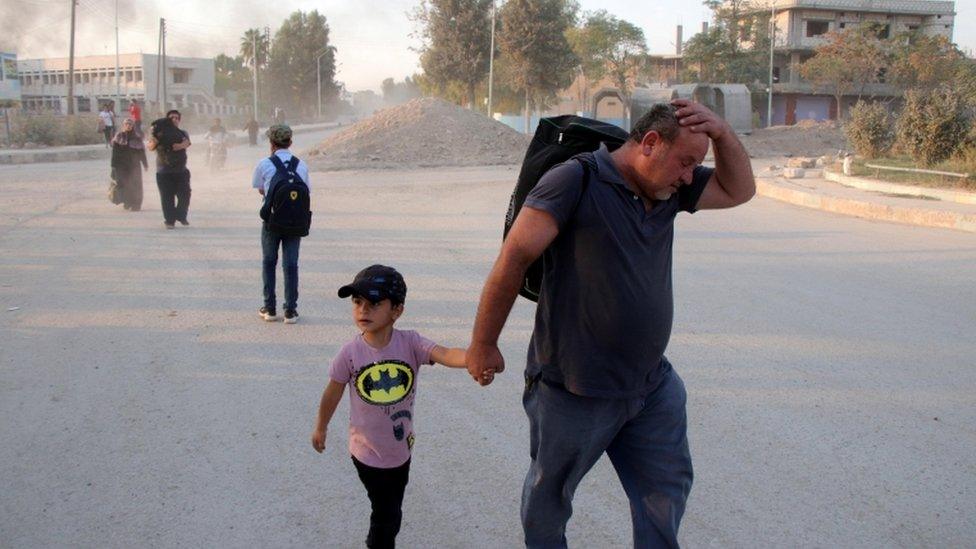
Residents flee their home town of Ras al-Ain
Aid groups say as many as 450,000 could be forced to move.
According to aid workers on the ground, the vast majority of civilians have fled Tal Abyad and those who remain fear for their lives.
Meanwhile a statement by the UN refugee agency says the Turkish bombardment has affected key civilian infrastructure such as water pumping stations, dams, power stations and oil fields. Thousands of people could lose adequate access to clean water in Hasakeh region, it said.
Turkey wants to create a "safe zone" running for 480km (300 miles) along the Syrian side of the border but says it will not advance deeper than a planned 32km limit.

The groups on the ground
SDF - Syrian Democratic Forces - A multi-ethnic alliance of mostly Kurdish and Arab militias that has been the critical partner on the ground in Syria for the US-led multinational coalition against the jihadist group Islamic State (IS).
YPG - People's Protection Units - The military wing of the Syrian Kurdish Democratic Union Party (PYD). It is the dominant force in the SDF. The Women's Protection Units (YPJ) is the YPG's all-female brigade.
PKK - Kurdistan Workers' Party - A Kurdish rebel group that has fought for Kurdish autonomy in Turkey for three decades. It is designated as a terrorist group by Turkey, the US and EU. Turkey says the YPG is an extension of the PKK - a claim both groups deny.
SNA - Syrian National Army - The new name for a loose alliance of Syrian rebel factions backed by Turkey previously known as the Free Syrian Army (FSA). SNA fighters are taking part in the ground offensive in north-eastern Syria.

What has the reaction been?
The UN Security Council discussed the situation on Thursday at the request of its current five EU members - the UK, France, Germany, Belgium and Poland - who are calling for Turkey to halt its military offensive.
UN Secretary General Antonio Guterres expressed his "deep concern" at the rising violence.
On Friday Nato Secretary General Jens Stoltenberg said he had shared "serious concerns" about the operation in a meeting with Turkish Foreign Minister Mevlut Cavusoglu.
He expected Turkey, a Nato member, to "act with restraint", he added.
Mr Erdogan has strongly defended the incursion, threatening to send some of the 3.6 million Syrian refugees it hosts to Europe if the Turkish offensive is described as an occupation.
How is the incursion affecting the IS situation?
The SDF say they are holding more than 12,000 suspected IS members in seven prisons, and at least 4,000 of them are foreign nationals. The exact locations have not been revealed, but some are reportedly close to the Turkish border.
Inside the camp of IS families in Syria
Two camps - Roj and Ain Issa - holding families of suspected IS members are inside the "safe zone".
On Friday the Kurdish-led authorities said discussions were under way on how to move the Ain Issa camp, which had been hit by shelling.
Turkey has said it will take responsibility for the IS prisoners it found during its offensive.
- Published10 October 2019
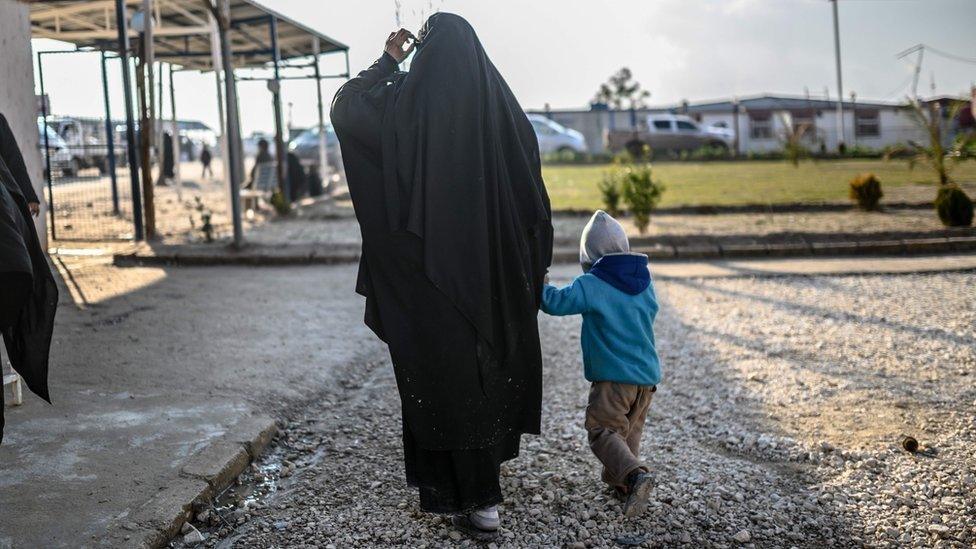
- Published10 October 2019
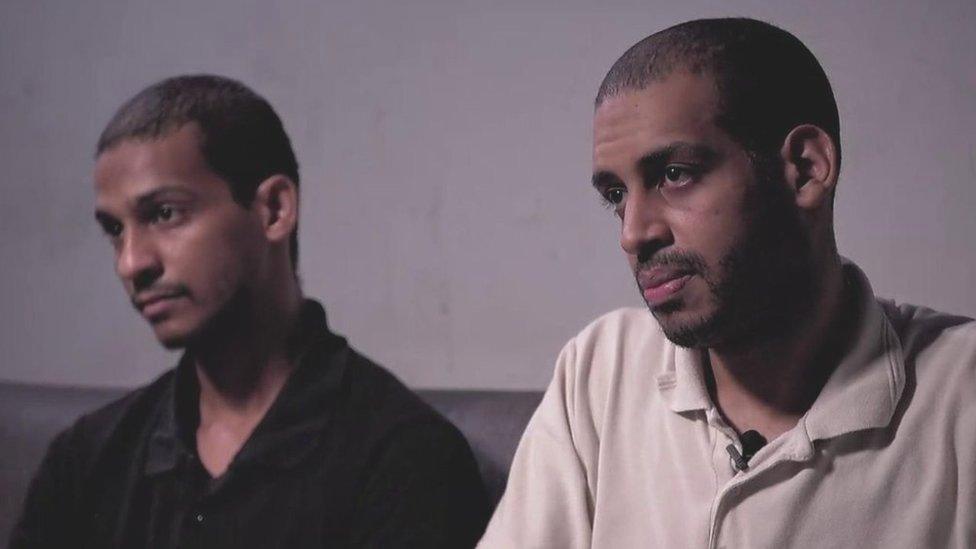
- Published9 October 2019
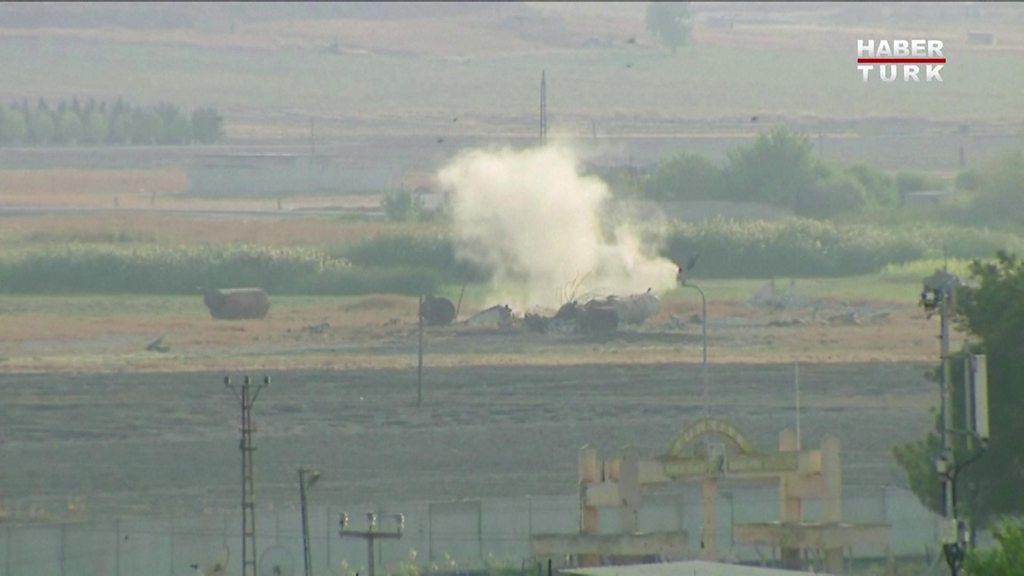
- Published2 February 2018
- Published30 July 2019
